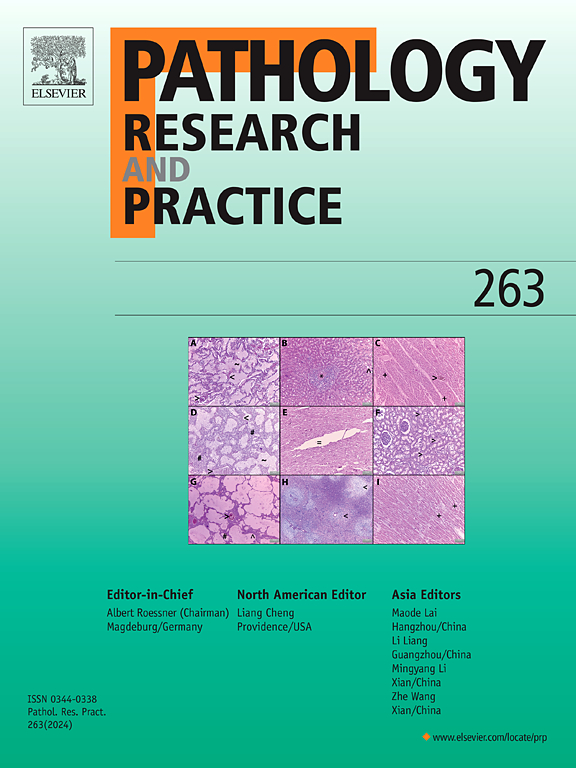Apoptosis, ferroptosis, and the autophagy paradox in peritoneal metastasis
IF 3.2
4区 医学
Q2 PATHOLOGY
引用次数: 0
Abstract
Peritoneal metastasis (PM) correlates with a diminished prognosis. Throughout the progression of PM, programmed cell death (PCD) often functions as the body's defense mechanism to eliminate aberrant malignant cells. Paradoxically, PCD within tumor cell populations also holds the potential to exert a pro-cancer effect by modulating the tumor microenvironment (TME). Apoptosis-mediated innate immune cells may orchestrate the pro-cancer TME and could potentially evade cancer therapy. This discussion delineates the impacts of PCD in PM, particularly focusing on apoptosis, ferroptosis, and autophagy, constituting a "double paradox" process. On one hand, PM is restrained through the removal of cancer cells, while on the other hand, it is propelled by the stimulation of repair and regenerative responses in the TME. Furthermore, the interplay of various PCDs such as cell apoptosis, autophagy, and ferroptosis in PM is explored, alongside a summary of PCD-based anticancer strategies. These insights aim to provide a theoretical basis for the prevention and treatment of PM.
腹膜转移中的细胞凋亡、铁下垂和自噬悖论
腹膜转移(PM)与预后降低相关。在PM的整个发展过程中,程序性细胞死亡(PCD)经常作为机体的防御机制来消除异常的恶性细胞。矛盾的是,肿瘤细胞群中的PCD也有可能通过调节肿瘤微环境(TME)来发挥促癌作用。凋亡介导的先天免疫细胞可能协调癌前TME,并可能潜在地逃避癌症治疗。本文讨论了PCD对PM的影响,特别关注细胞凋亡、铁下垂和自噬,这构成了一个“双重悖论”过程。一方面,PM通过去除癌细胞而受到抑制,另一方面,PM通过刺激TME中的修复和再生反应而受到推动。此外,我们还探讨了各种PCDs(如细胞凋亡、自噬和铁凋亡)在PM中的相互作用,并总结了基于PCDs的抗癌策略。这些见解旨在为PM的预防和治疗提供理论依据。
本文章由计算机程序翻译,如有差异,请以英文原文为准。
求助全文
约1分钟内获得全文
求助全文
来源期刊
CiteScore
5.00
自引率
3.60%
发文量
405
审稿时长
24 days
期刊介绍:
Pathology, Research and Practice provides accessible coverage of the most recent developments across the entire field of pathology: Reviews focus on recent progress in pathology, while Comments look at interesting current problems and at hypotheses for future developments in pathology. Original Papers present novel findings on all aspects of general, anatomic and molecular pathology. Rapid Communications inform readers on preliminary findings that may be relevant for further studies and need to be communicated quickly. Teaching Cases look at new aspects or special diagnostic problems of diseases and at case reports relevant for the pathologist''s practice.

 求助内容:
求助内容: 应助结果提醒方式:
应助结果提醒方式:


